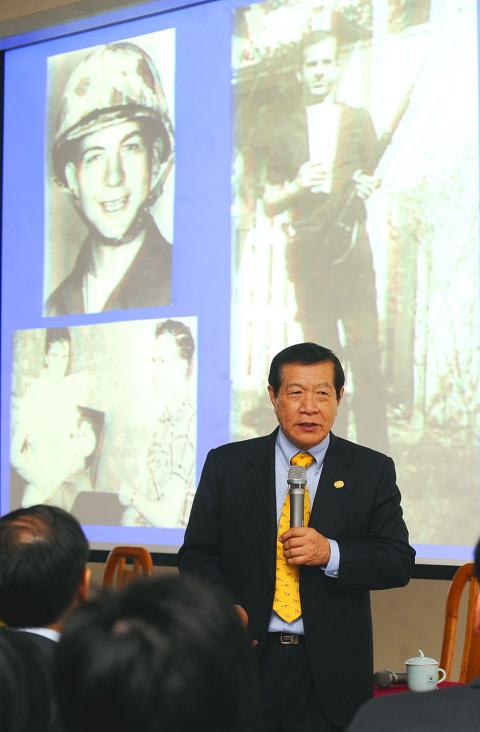Forensic scientist Henry Lee (李昌鈺) will join the team of investigators looking into the circumstances surrounding the shooting of Sean Lien (連勝文) on the eve of the special municipality elections late last month.
The US-based Lee, who was in Taiwan yesterday to attend the establishment of the “Henry Lee Forensic Science Lecture Workshop” at National Taiwan University of Science and Technology, told reporters he had discussed Lien’s case with the Criminal Investigation Bureau, especially regarding the German-made pistol believed to have been used in the shooting.
Lee said he would look at the forensics and material evidence, but would not involve himself in the criminal and political aspects of the case.

PHOTO: WANG MIN-WEI, TAIPEI TIMES
“I only want to do forensic work on this case; other investigation activities relating to the case are of no interest to me,” he said. “Criminal investigations should not be mixed with forensic work.”
It would not be the first time Lee has assisted investigators in high-profile criminal cases. He helped forensics experts in their probe of the March 2004 election-eve assassination attempt on former president Chen Shui-bian (陳水扁) and vice president Annette Lu (呂秀蓮).
Judicial authorities have been under pressure to resolve the Lien case, in which Huang Yun-sheng (黃運聖), a 29-year-old bystander, was killed.
Suspected gunman Lin Cheng-wei (林正偉), who also goes by the name Ma Mien (馬面), has reportedly told investigators that he shot Lien, a son of former vice president Lien Chan (連戰), by mistake, saying that he had wanted to shoot a local Chinese Nationalist Party (KMT) politician, Taipei County Deputy Speaker Chen Hung-yuan (陳鴻源), because of a land dispute involving Chen Hung-yuan’s family.
Lin’s claim was supported by the results of two polygraph sessions.
Sean Lien, who was shot in the face and was hospitalized for nine days, says the shooter was targeting him and not Chen Hung-yuan.
The incident gave rise to speculation that it was staged by KMT politicians, coming as it did just hours before the Nov. 27 elections.
Commenting on Sean Lien’s rapid recovery, Lee said it was possible for a person to recover quickly from non-fatal gunshot wounds and that a quick recovery did not necessarily mean that the shooting had been orchestrated.
A person can recover quite quickly from a shooting that does not damage major organs or tissue, he said.
The bullet entered Sean Lien’s left cheek and exited near his right temple. On his first public appearance after his discharge from hospital, Sean Lien had bandages on both sides of his face, wore a surgical mask and had a bloodshot eye. Reports that he was smiling and could eat bread days after the incident gave rise to speculation that the shooting may have been staged, or the severity of his wounds overplayed.
KMT Legislator Hsieh Kuo--liang (謝國樑), a close friend of Sean Lien, said he welcomed Lee’s participation in the investigation.
ADDITIONAL REPORTING BY FLORA WANG, STAFF REPORTER AND CNA

Conflict with Taiwan could leave China with “massive economic disruption, catastrophic military losses, significant social unrest, and devastating sanctions,” a US think tank said in a report released on Monday. The German Marshall Fund released a report titled If China Attacks Taiwan: The Consequences for China of “Minor Conflict” and “Major War” Scenarios. The report details the “massive” economic, military, social and international costs to China in the event of a minor conflict or major war with Taiwan, estimating that the Chinese People’s Liberation Army (PLA) could sustain losses of more than half of its active-duty ground forces, including 100,000 troops. Understanding Chinese

The Ministry of Foreign Affairs (MOFA) yesterday said it is closely monitoring developments in Venezuela, and would continue to cooperate with democratic allies and work together for regional and global security, stability, and prosperity. The remarks came after the US on Saturday launched a series of airstrikes in Venezuela and kidnapped Venezuelan President Nicolas Maduro, who was later flown to New York along with his wife. The pair face US charges related to drug trafficking and alleged cooperation with gangs designated as terrorist organizations. Maduro has denied the allegations. The ministry said that it is closely monitoring the political and economic situation

‘SLICING METHOD’: In the event of a blockade, the China Coast Guard would intercept Taiwanese ships while its navy would seek to deter foreign intervention China’s military drills around Taiwan this week signaled potential strategies to cut the nation off from energy supplies and foreign military assistance, a US think tank report said. The Chinese People’s Liberation Army (PLA) conducted what it called “Justice Mission 2025” exercises from Monday to Tuesday in five maritime zones and airspace around Taiwan, calling them a warning to “Taiwanese independence” forces. In a report released on Wednesday, the Institute for the Study of War said the exercises effectively simulated blocking shipping routes to major port cities, including Kaohsiung, Keelung and Hualien. Taiwan would be highly vulnerable under such a blockade, because it

UNRELENTING: China attempted cyberattacks on Taiwan’s critical infrastructure 2.63 million times per day last year, up from 1.23 million in 2023, the NSB said China’s cyberarmy has long engaged in cyberattacks against Taiwan’s critical infrastructure, employing diverse and evolving tactics, the National Security Bureau (NSB) said yesterday, adding that cyberattacks on critical energy infrastructure last year increased 10-fold compared with the previous year. The NSB yesterday released a report titled Analysis on China’s Cyber Threats to Taiwan’s Critical Infrastructure in 2025, outlining the number of cyberattacks, major tactics and hacker groups. Taiwan’s national intelligence community identified a large number of cybersecurity incidents last year, the bureau said in a statement. China’s cyberarmy last year launched an average of 2.63 million intrusion attempts per day targeting Taiwan’s critical